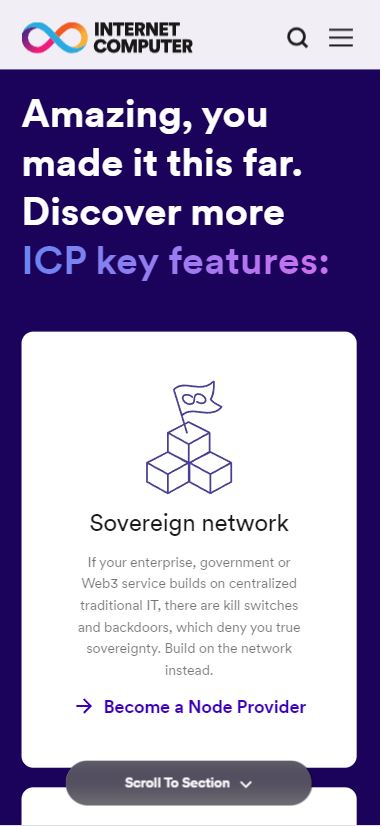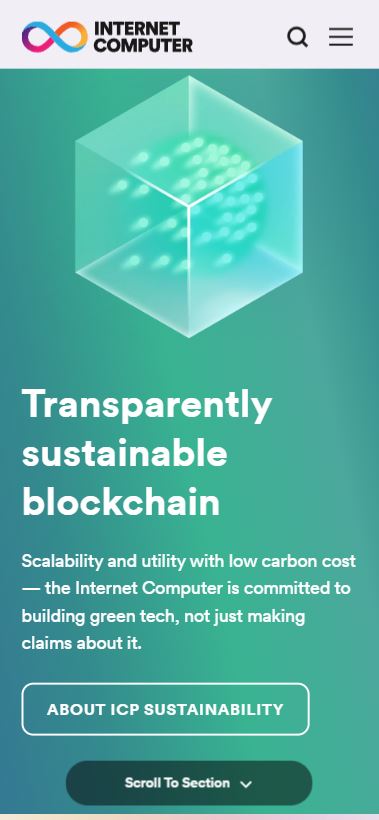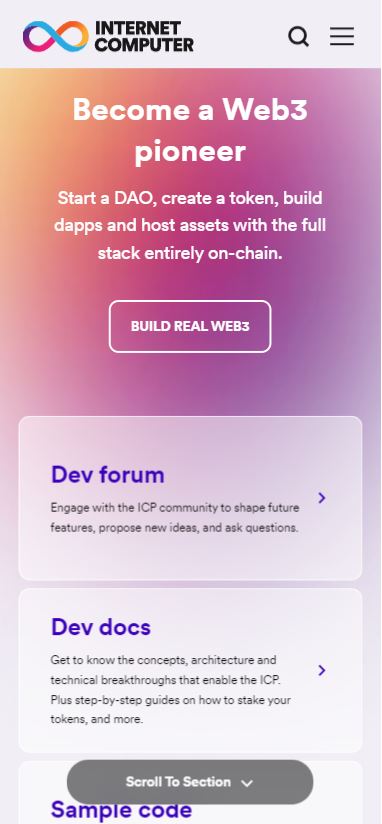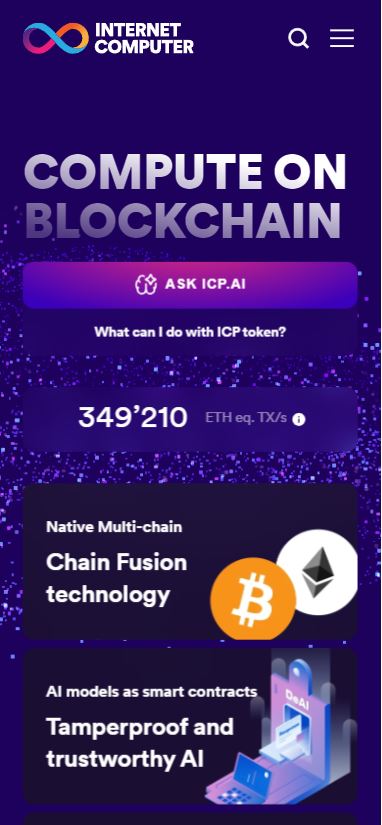Over View Internet Computer (ICP)
Internet Computer (ICP) is a groundbreaking blockchain platform designed to enable the creation and operation of decentralized applications (dApps) without relying on traditional cloud services or centralized infrastructure. It was developed by the DFINITY Foundation, founded by Dominic Williams in 2015. The project aims to transform the internet into a decentralized “world computer” by creating a faster, more scalable, and more secure alternative to traditional web services.
The Internet Computer is powered by a unique technology stack, including Chain Key Cryptography, Canister Smart Contracts, and a governance mechanism through the Network Nervous System (NNS) DAO. These features help ensure that dApps and Web3 services can run autonomously, securely, and without the need for intermediaries or centralized control.

Key Features of Internet Computer (ICP)
1. Decentralized Web (Web3) Enabler
- The Internet Computer is specifically designed to support Web3 platforms by providing an infrastructure that avoids the privacy, security, and censorship issues associated with traditional centralized internet services (e.g., cloud computing, databases, and web servers).
- It allows developers to build fully decentralized applications where data storage, computation, and governance are handled on the blockchain rather than through centralized servers or cloud providers.
2. Sovereign Network of Dedicated Node Machines
- The Internet Computer is powered by a network of dedicated “node machines” operated by independent node providers across the world. These machines form a decentralized network that operates without relying on centralized IT infrastructure (like traditional cloud services), thus achieving full decentralization.
- These nodes run autonomously and work together to maintain the network, ensuring its security and scalability.
3. Chain Key Cryptography
- The platform uses a unique cryptography framework called Chain Key Cryptography to allow secure transactions and data verification. This allows the Internet Computer to have a public “chain key” and use distributed private keys to sign messages securely and efficiently. This system makes it more scalable than traditional blockchains.
- Chain Key Cryptography ensures that the authenticity of the messages and data coming from the Internet Computer blockchain can be verified easily and quickly, reducing the data load and improving performance.
4. Canister Smart Contracts
- Canisters are the unique form of smart contracts on the Internet Computer. Canisters are software “actors” that contain both the business logic (WebAssembly bytecode) and persistent memory (state) required for their operation. They run in parallel, deterministically, and can execute complex tasks without the need for external servers or infrastructure.
- Canisters can interact directly with the internet and other blockchains without the need for bridges, enabling decentralized applications (dApps) to scale in a more efficient manner compared to traditional blockchain applications.
5. Subnet Blockchains
- The Internet Computer blockchain is structured into subnet blockchains, which are independent blockchains that combine to form a unified, limitless network. This architecture allows the network to scale easily, as new subnets can be added to increase capacity without requiring copies of each other’s state.
- These subnet blockchains interact directly with each other, allowing applications to seamlessly operate across them.
6. Network Nervous System (NNS)
- The NNS is the DAO (Decentralized Autonomous Organization) that governs the Internet Computer network. It manages the network’s operations and sets parameters for consensus, network upgrades, and governance.
- The NNS is also responsible for managing the addition and removal of node machines from the network and ensuring the overall integrity and security of the Internet Computer.
7. Scalability and Performance
- One of the most significant features of the Internet Computer is its speed and scalability. Unlike many blockchain networks that take minutes or hours to process transactions, the Internet Computer can process transactions at web speed, making it much more suitable for real-time applications.
- With its innovative technology, the platform is designed to handle massive workloads, including running large-scale dApps and Web3 services, while maintaining decentralized security.

ICP Token: Utility and Value
The native utility token of the Internet Computer network is ICP, and it serves several important functions within the ecosystem:
- Governance
- ICP holders can participate in the governance of the Internet Computer via the Network Nervous System (NNS). This DAO allows participants to vote on proposals that shape the future of the network, including decisions about protocol upgrades and network changes.
- Voting power is proportional to the amount of ICP a user holds, encouraging long-term commitment and community engagement.
- Staking
- ICP can be staked to create voting neurons, which are used to participate in the NNS governance process. Staking ICP helps secure the network and ensures that decisions are made in a decentralized manner.
- Stakers are rewarded with more ICP tokens for their participation, further incentivizing network growth and stability.
- Fuel for Computation
- ICP tokens are also used to convert into cycles, which fuel the execution of smart contracts (canisters). When ICP is converted into cycles, it is burned, creating a deflationary mechanism that helps reduce the total supply of ICP tokens over time.
- This mechanism ensures that the cost of running decentralized applications on the Internet Computer is sustainable and incentivizes developers to use the platform efficiently.
- Store of Value
- ICP functions as a store of value, enabling users to invest in the decentralized services powered by the Internet Computer blockchain. This creates demand for ICP as the network expands and more Web3 services are built on the platform.
Why Does Internet Computer (ICP) Have Value?

- Unique Architecture: The Internet Computer’s unique combination of chain key cryptography, decentralized node machines, and canister smart contracts provides a high level of scalability and efficiency. These features allow developers to build fully decentralized applications that run at web speed, without relying on traditional cloud infrastructure.
- Governance and Staking: The ICP token gives holders a stake in the governance of the Internet Computer network. This creates an incentive for users to hold and stake ICP, thereby contributing to the security and development of the platform.
- Deflationary Mechanism: The burning of ICP tokens when they are converted into cycles for computation helps reduce the circulating supply over time, potentially increasing the value of the remaining tokens.
- Web3 Enabler: ICP facilitates the growth of decentralized applications and services (Web3) by offering a platform that can scale and run these services efficiently. As more developers and users join the ecosystem, the demand for ICP tokens will likely increase.
Internet Computer (ICP) represents a transformative shift in how decentralized applications and Web3 services are built and operated. By combining blockchain technology with decentralized computing power and advanced cryptographic mechanisms, ICP aims to create a fully decentralized internet that is faster, more scalable, and more secure than traditional cloud-based solutions. With the governance and utility mechanisms provided by the ICP token, the Internet Computer has the potential to be a cornerstone of the Web3 ecosystem.

























Harran –
good
lykarose navarro –
Perfect !